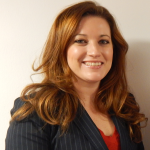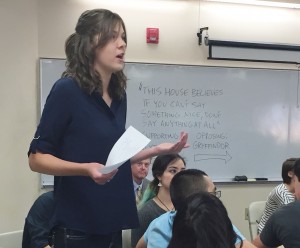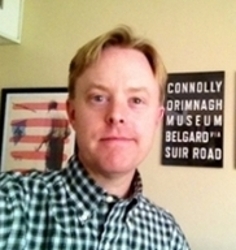Whether in research or teaching, as historians we wrestle with the big questions of our specialized fields. Unfortunately, far too often one of the biggest questions about the discipline goes unasked and unanswered: What do professors actually do?
On a typical Wednesday morning, students pass through the University of New Mexico’s Zimmerman Library and grab a much-needed coffee before they head into History 101 to debate Western society’s “biggest of the big questions.” Three times a week, students join their debate team members and make their best case for defining the rule of law, just wars, good governments, and religious utility. And thrice a week, assistant professor of British and Irish cultural history Caleb Richardson guides students through the distant past to help them understand the values, beliefs, and practices that define their present.
As the History 101 students review their debate strategy packets, I meet with Richardson and ask him what a typical “professoring” day looks like for him.
Caleb Richardson’s day starts well before 8:00 a.m. Most mornings, he tells me, the alarm goes off at 5:30 a.m. and by 6:00 a.m. his six-year old son demands cereal after the snooze button has stopped working. After feeding his youngest, Richardson hits the gym lamenting that “the biggest difference between graduate school and the tenure track is that it is no longer socially acceptable to exercise in the middle of the day.” Richardson is approaching his mid-probationary review. Staying sharp both mentally and physically is par for the course.
While packing school lunches for his two sons, Richardson squeezes in an hour of The History Show on RTÉ, Ireland’s national public-service media outlet. By 8:00 a.m., the Richardsons run out the door and make their way to their respective school drop points. This particular morning, the youngest son informs his dad that he “hates Nazis”—a comment that would warm any historian’s heart.
After arriving on campus, Richardson shoots a quick e-mail to his History 101 students informing them of the room change for their debates. The clock just now reaches 9:00 a.m. In the 45 minutes remaining before he has to leave for class, Richardson crams in a Skype session with a few Irish contacts to update them on recent developments for UNM’s short-term study abroad program in Ireland. Who knew a working knowledge of student visa requirements, study abroad protocols, university administration, and a navigation of consular affairs would come in handy for a historian of 19th-century Ireland? Professoring 101: You’re going to have departmental projects that may or may not have anything to do with your research specialization. You’ll need to learn quickly to navigate those waters.
Joining Richardson in class that morning, I feel the energy in the room. It’s 9:55 a.m.; first-year students aren’t typically this animated this early unless there is a sporting event. The nervous excitement builds. Two debate teams, six students on each side, huddle together under … wait for it … Hogwarts House Banners. A Gryffindor-Slytherin matchup! During the next 50 minutes, with the help of their professor and graduate assistant, the students deliver a rapid back-and-forth Oxford-style debate on the merits of free speech, civility, individual rights, and the legal and moral obligations of citizens, citing thinkers from Cicero to Martin Luther King Jr. to Jon Stewart. The Slytherins snag a victory, receiving their own “golden snitch,” and all students walk away with experience in public speaking, collaboration, philosophical arguments, and conducting on-the-fly research to counter-pose arguments. Professoring 101: Get your students to love (or at least tolerate) your course. Remember what it was like to be in a “required” class. Be creative.
After speaking with a few students after class and touching base with his graduate assistant, Richardson heads back to his office. The time is now 11:00 a.m. By 11:02 a.m., he breaks for coffee. He says, “I’m [always] embarrassed when baristas hand me a double espresso with my name already on it before I have ordered everything.” Professoring 101: Get to know your campus baristas. They will save your life.
11:10 a.m. He’s back at his desk, ready to “begin” grading papers on “Magna Carta: Myth or Reality?” 11:12 a.m. He switches gears and checks Guardian, Telegraph, Irish Times, and Irish Independent websites while drafting a conference proposal for the Society of Military History that is due by 11:59 p.m.
During a quick lunch Richardson grades the “remaining” Magna Carta papers, and meets with his faculty mentor to discuss his upcoming mid-probationary review. After delivering a lecture in his Modern British History class, Richardson spends his afternoon editing page proofs for a forthcoming article in a book collection and converses with fellow officers in an Irish Studies group on an upcoming conference. Professoring 101: Set aside afternoons for department meetings, conference calls, e-mail blasts, and other meetings. Don’t think your afternoon is reserved for research.
His day isn’t over though. His sons have to be picked up from school and taken to their sporting activities. He texts his wife to clarify which field and which sport. Once everyone is home, practice equipment stored away, dinner eaten, Foyle’s War vetoed, and The Big Green screened, Richardson returns to his research: constructing a database of Anglo-Irish families. “I am reminded how much I love research, and how much I love the name ‘James Robert Barry Bury-Barry.’” Professoring 101: Sometimes your family doesn’t want to watch a historical drama, but the brief respite will reenergize you.
Two hours later, Richardson wakes up, convinced he has forgotten something. The proposal for the Society for Military History conference! A few finishing touches, an apologetic e-mail to the programming committee, and his day finally comes to an end. Just another day in Professoring 101.

The author, Jennifer McPherson, is a PhD candidate at the University of New Mexico. Her dissertation, “‘Not Your Mother’s PTA’: Parents, Public Authority, and the Professionalization of Politics,” examines the roots of parents’ political authority through the lens of the National Parent Teacher Association branches in Denver, Colorado, from 1920 to 2000. She is the graduate assistant at UNM’s Center for the Southwest and is currently the graduate coordinator for the AHA-Mellon Career Diversity Project at UNM.
This post first appeared on AHA Today.
Tags: AHA Today Career Diversity for Historians Resources for Early Career Resources for Graduate Students Graduate Education
Comment
Please read our commenting and letters policy before submitting.








